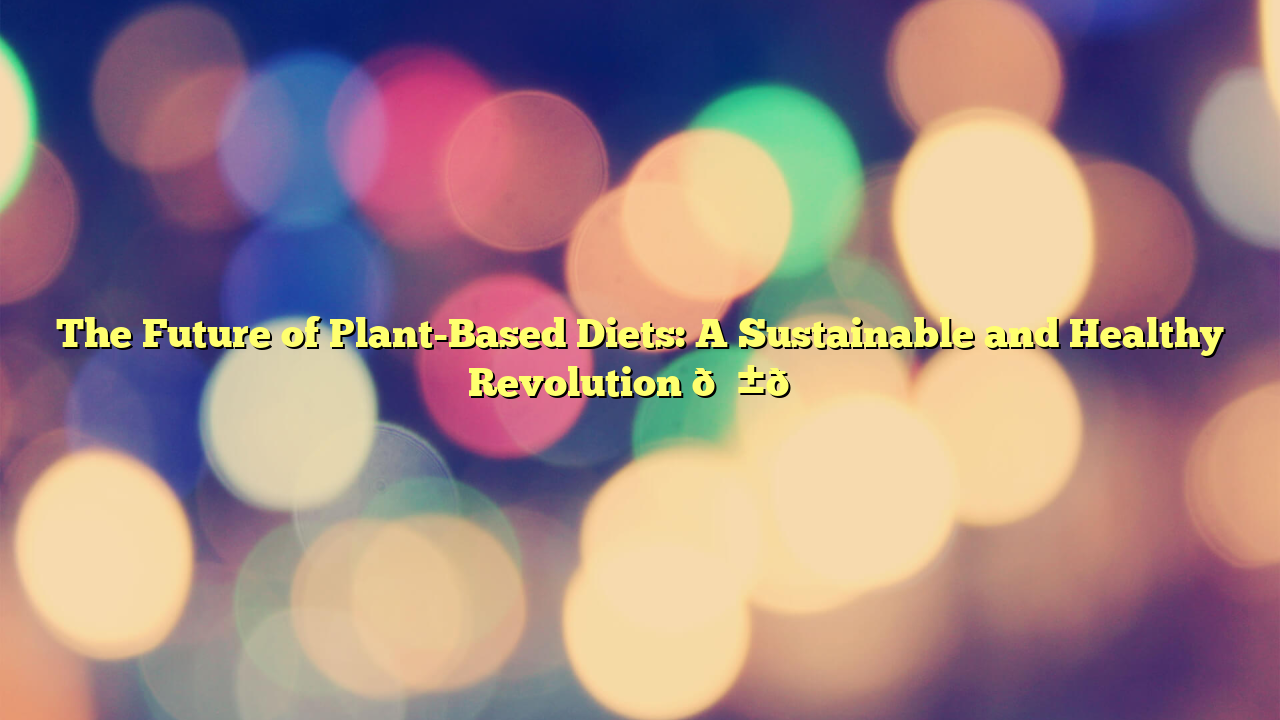The plant-based diet movement has gained massive popularity in recent years, with more people choosing to reduce their consumption of animal products. Whether for health reasons, environmental concerns, or ethical beliefs, plant-based diets are shaping the future of food.
But what does the future hold for plant-based eating? In this article, we’ll explore the growth of plant-based diets, their benefits, new food innovations, and how this trend is transforming the global food industry.
1. The Rise of Plant-Based Diets 📈
More people than ever are adopting plant-based lifestyles, whether by becoming vegetarian, vegan, or flexitarian (reducing meat but not eliminating it entirely).
Why Are People Switching to Plant-Based Diets?
✔ Health Benefits ✔ Environmental Impact ✔ Animal Welfare ✔ Food Innovation – Availability of plant-based meat, dairy alternatives, and new products.
Studies show that plant-based food sales are skyrocketing, with the market expected to reach $162 billion by 2030! 🌍💰
2. Health Benefits of a Plant-Based Diet 🥦
Switching to a plant-based diet has been linked to numerous health benefits, including:
✅ Heart Health
Plant-based diets are rich in fiber, antioxidants, and healthy fats, helping to lower cholesterol, blood pressure, and heart disease risk.
✅ Weight Management
People on plant-based diets tend to consume fewer calories and have lower body mass indexes (BMI).
✅ Reduced Risk of Chronic Diseases
A diet rich in fruits, vegetables, whole grains, and legumes reduces the risk of type 2 diabetes, certain cancers, and neurodegenerative diseases.
✅ Improved Gut Health
Plant-based diets contain prebiotic fiber, which promotes a healthy gut microbiome.
💡 Tip: A balanced plant-based diet should include a variety of proteins (lentils, beans, tofu), healthy fats (avocado, nuts), and essential vitamins (B12, iron, omega-3s).
3. Plant-Based Food Innovations 🌿🍔
The food industry is responding to demand by creating plant-based alternatives that taste, feel, and cook like animal products. Some exciting innovations include:
🍔 Plant-Based Meat Alternatives
Brands like Beyond Meat, Impossible Foods, and Future Farm are creating meat substitutes that mimic the texture and taste of beef, chicken, and even seafood.
🥛 Dairy-Free Milk & Cheese
Almond, oat, soy, and coconut milk are dominating supermarket shelves, while brands like Violife and Miyoko’s are reinventing plant-based cheese.
🥚 Vegan Eggs & Seafood
Companies like JUST Egg are producing plant-based eggs, while others are developing vegan sushi, shrimp, and fish fillets.
🌾 Lab- idtoto4d & Fermented Proteins
Future foods like precision fermentation (Perfect Day) and cell-based meat may revolutionize food production while reducing environmental impact.
4. The Environmental Impact 🌍
Switching to a plant-based diet isn’t just good for health—it’s crucial for the planet.
🌱 Lower Carbon Emissions – Livestock farming accounts for 14.5% of global greenhouse gases 🌱 Less Water Usage – Producing 1kg of beef requires 15,400 liters of water, while 1kg of lentils uses only 1,250 liters 🌱 Reduced Deforestation – Cutting meat consumption reduces land use and protects rainforests.
💡 Fact: If the world adopted a plant-based diet, global farmland use could shrink by 75%, helping restore ecosystems!
5. Challenges & Misconceptions 🤔
Despite the benefits, some people are hesitant to adopt plant-based diets due to misconceptions:
❌ “Plant-based diets lack protein.” ✅ Truth: Legumes, tofu, quinoa, and nuts provide plenty of protein.
❌ “It’s too expensive!” ✅ Truth: Beans, lentils, and grains are often cheaper than meat.
❌ “Plant-based food doesn’t taste good.” ✅ Truth: Modern plant-based alternatives mimic meat, dairy, and seafood incredibly well.
6. How to Transition to a Plant-Based Diet 🥗
Thinking of trying a plant-based diet? Here’s how to start:
✅ Go Slow: Try Meatless Mondays ✅ Experiment: Discover plant-based proteins like tofu, tempeh, and jackfruit ✅ Plan Your Meals: Balance nutrients by including proteins, healthy fats, and whole grains ✅ Explore New Recipes: ✅ Read Labels: Some plant-based products can be high in sodium or additives—choose wisely.
7. The Future of Plant-Based Diets 🚀
The future of food is greener and more sustainable. We can expect:
🌍 More plant-based fast-food options 🌱 Advanced meat alternatives 🏪 Supermarkets stocking more plant-based products 👩🔬 More research on plant-based nutrition to optimize health benefits.
💡 By 2050, plant-based diets could be the norm, drastically reducing environmental harm and improving global health.
8. Final Thoughts: The Time for Change is Now! 🌿🔥
The plant-based revolution is here, and it’s not just a trend—it’s the future of food. Whether for health, sustainability, or ethics, switching to more plant-based meals can have a positive impact on you and the planet.
Would you consider going plant-based? Let’s discuss! 🍃💬
The Future of Plant-Based Diets: A Sustainable and Healthy Revolution 🌱🌎


